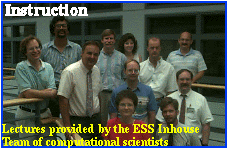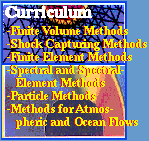Fourth NASA Summer School in High Performance Computational Physics
Objective: Train the next generation of Earth and space scientists in massively parallel techniques and algorithm development to support the goals of the HPCC Program.
Approach: The NASA Summer School in High Performance Computational Physics is an intensive three-week program of lectures and lab sessions held at the NASA Goddard Space Flight Center in the early summer. It is jointly sponsored by HPCC/ESS and Goddard's Space Data and Computing Division.  Sixteen students are selected through a national solicitation performed by USRA. They must be working toward PhDs in a physical science discipline related to NASA/Goddard's research and have an interest in utilizing massively parallel computer architectures to solve problems within their respective fields. The students are brought to Goddard from their home institutions and housed at the University of Maryland during the program.
Sixteen students are selected through a national solicitation performed by USRA. They must be working toward PhDs in a physical science discipline related to NASA/Goddard's research and have an interest in utilizing massively parallel computer architectures to solve problems within their respective fields. The students are brought to Goddard from their home institutions and housed at the University of Maryland during the program.
 The GSFC/ESS In-house Team (S. Zalesak/GSFC, C.Mobarry/GSFC, A.Deane/GMU, B.Fryxell/GMU, K.Olson/GMU, R.DeFainchtein/GMU, P.MacNeice/HSTX) as well as guest lecturers (P.Collela/UC Berkeley, R.Lohner/GMU, M.Suarez/GSFC) served as instructors for the 1994 session. Lectures focus on advanced techniques in computational science, with special emphasis on computational fluid dynamics as applicable to Earth and space sciences and on algorithms for scalable parallel computer architectures.
The GSFC/ESS In-house Team (S. Zalesak/GSFC, C.Mobarry/GSFC, A.Deane/GMU, B.Fryxell/GMU, K.Olson/GMU, R.DeFainchtein/GMU, P.MacNeice/HSTX) as well as guest lecturers (P.Collela/UC Berkeley, R.Lohner/GMU, M.Suarez/GSFC) served as instructors for the 1994 session. Lectures focus on advanced techniques in computational science, with special emphasis on computational fluid dynamics as applicable to Earth and space sciences and on algorithms for scalable parallel computer architectures.  Access to scalable computer systems is provided to serve as teaching platforms. The vendors of the selected systems (MasPar Computer Corporation and Cray Research Inc. for the 1994 session) are brought in to give lectures and hands-on workshops on code development for their product.
Access to scalable computer systems is provided to serve as teaching platforms. The vendors of the selected systems (MasPar Computer Corporation and Cray Research Inc. for the 1994 session) are brought in to give lectures and hands-on workshops on code development for their product.
Accomplishments:
- Students became functional in the art of "thinking parallel"
- They became knowledgeable in advanced computational techniques
- They became hooked on the power of emerging scalable parallel systems
- Most students requested continued access to Goddard's parallel testbed computers
 Significance: The four sessions that the school has operated have assisted the ESS Project to understand the formal training requirements of intelligent but novice users of scalable parallel systems and to evolve a suitable curriculum to meet these needs. Consideration is being given to publication of the lecture series in the form of a book. The sessions also provide the Project insight into the types of difficulties new users will experience on scalable parallel systems. This information is shared with the hardware vendors to help their hardware and software design.
Significance: The four sessions that the school has operated have assisted the ESS Project to understand the formal training requirements of intelligent but novice users of scalable parallel systems and to evolve a suitable curriculum to meet these needs. Consideration is being given to publication of the lecture series in the form of a book. The sessions also provide the Project insight into the types of difficulties new users will experience on scalable parallel systems. This information is shared with the hardware vendors to help their hardware and software design.
Status/Plans: Based on the success of the program and the positive reactions of the students, ESS plans to continue the Summer School in FY95 and is considering its expansion in order to provide training for members of the Investigator teams selected through the ESS NRA.
Point of Contact:
Dr. Daniel Spicer
NASA Goddard Space Flight Center/Code 930
spicer@gauss.gsfc.nasa.gov
(301) 286-7334
curator: Larry Picha
 Sixteen students are selected through a national solicitation performed by USRA. They must be working toward PhDs in a physical science discipline related to NASA/Goddard's research and have an interest in utilizing massively parallel computer architectures to solve problems within their respective fields. The students are brought to Goddard from their home institutions and housed at the University of Maryland during the program.
Sixteen students are selected through a national solicitation performed by USRA. They must be working toward PhDs in a physical science discipline related to NASA/Goddard's research and have an interest in utilizing massively parallel computer architectures to solve problems within their respective fields. The students are brought to Goddard from their home institutions and housed at the University of Maryland during the program.  The GSFC/ESS In-house Team (S. Zalesak/GSFC, C.Mobarry/GSFC, A.Deane/GMU, B.Fryxell/GMU, K.Olson/GMU, R.DeFainchtein/GMU, P.MacNeice/HSTX) as well as guest lecturers (P.Collela/UC Berkeley, R.Lohner/GMU, M.Suarez/GSFC) served as instructors for the 1994 session. Lectures focus on advanced techniques in computational science, with special emphasis on computational fluid dynamics as applicable to Earth and space sciences and on algorithms for scalable parallel computer architectures.
The GSFC/ESS In-house Team (S. Zalesak/GSFC, C.Mobarry/GSFC, A.Deane/GMU, B.Fryxell/GMU, K.Olson/GMU, R.DeFainchtein/GMU, P.MacNeice/HSTX) as well as guest lecturers (P.Collela/UC Berkeley, R.Lohner/GMU, M.Suarez/GSFC) served as instructors for the 1994 session. Lectures focus on advanced techniques in computational science, with special emphasis on computational fluid dynamics as applicable to Earth and space sciences and on algorithms for scalable parallel computer architectures.  Access to scalable computer systems is provided to serve as teaching platforms. The vendors of the selected systems (MasPar Computer Corporation and Cray Research Inc. for the 1994 session) are brought in to give lectures and hands-on workshops on code development for their product.
Access to scalable computer systems is provided to serve as teaching platforms. The vendors of the selected systems (MasPar Computer Corporation and Cray Research Inc. for the 1994 session) are brought in to give lectures and hands-on workshops on code development for their product.
 Significance: The four sessions that the school has operated have assisted the ESS Project to understand the formal training requirements of intelligent but novice users of scalable parallel systems and to evolve a suitable curriculum to meet these needs. Consideration is being given to publication of the lecture series in the form of a book. The sessions also provide the Project insight into the types of difficulties new users will experience on scalable parallel systems. This information is shared with the hardware vendors to help their hardware and software design.
Significance: The four sessions that the school has operated have assisted the ESS Project to understand the formal training requirements of intelligent but novice users of scalable parallel systems and to evolve a suitable curriculum to meet these needs. Consideration is being given to publication of the lecture series in the form of a book. The sessions also provide the Project insight into the types of difficulties new users will experience on scalable parallel systems. This information is shared with the hardware vendors to help their hardware and software design.
 Return to the PREVIOUS PAGE
Return to the PREVIOUS PAGE